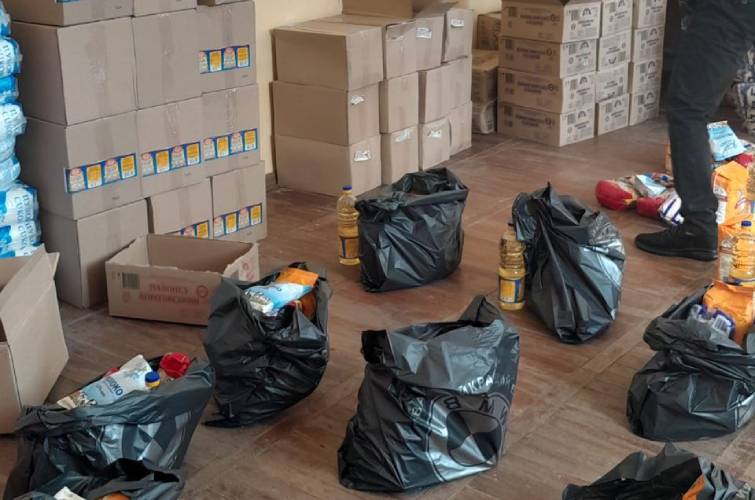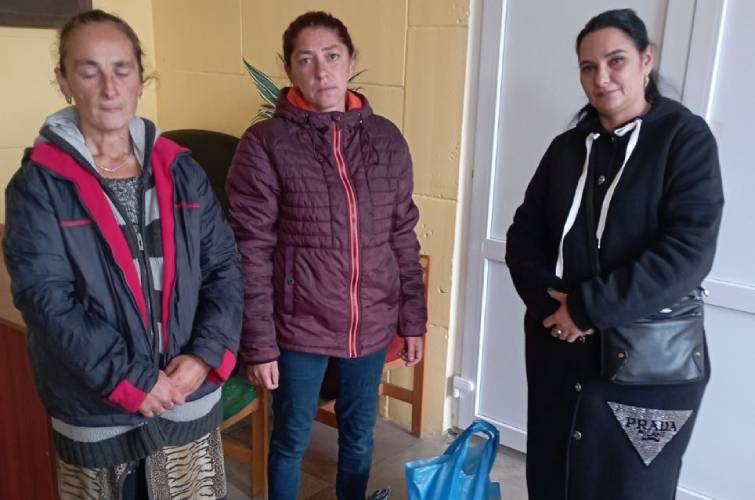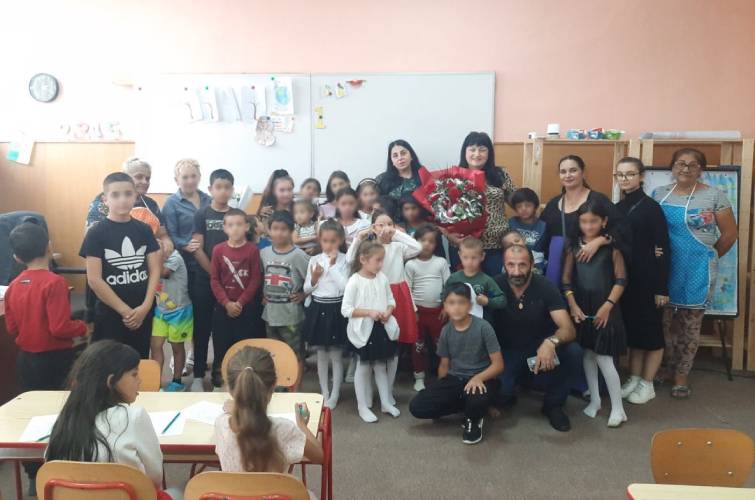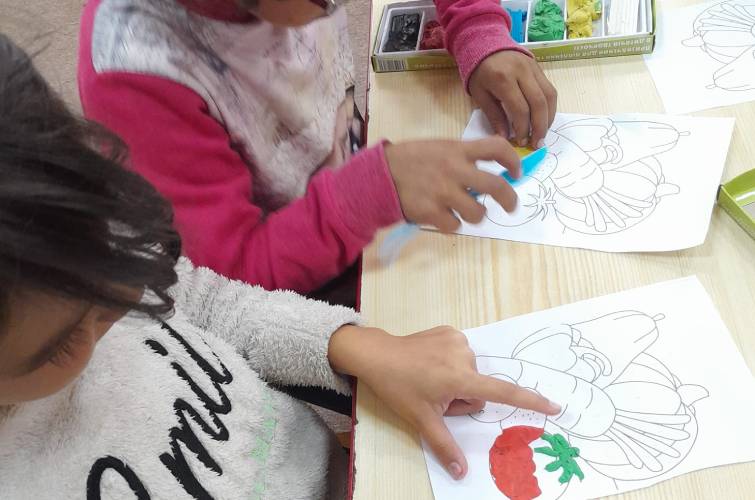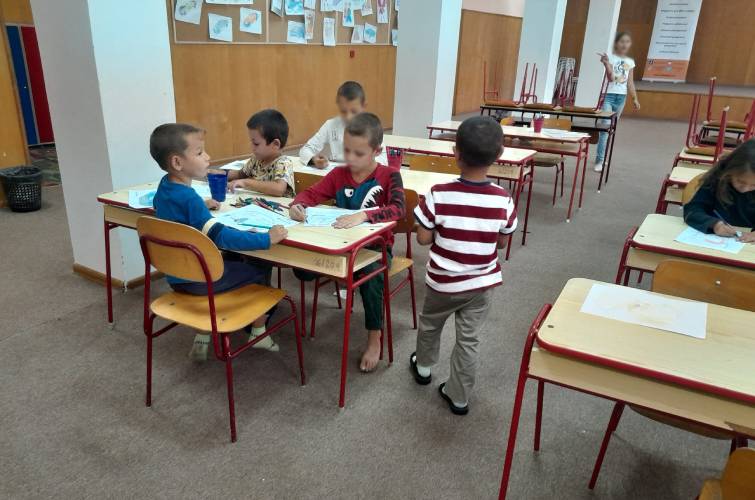The story of a Roma woman from Donetsk region of the Council of Kalandia, which coordinates the Roma settlement in Mukachevo
[ad_1]
Advertising:
Lives in Ukraine up to 400 thousand Roma Currently, some of them serve in the ranks of the Armed Forces.
About what Roma families face when fleeing war, “Ukrainian truth. Life“ told head of the “Romen” organization and a mediator in the Roma settlement in Mukachevo Rada Kalandia.
The woman shared stories about how she and her family were evacuated from Donetsk region, what she is currently doing in Transcarpathia, and talked about her dreams of returning to her former job.
Life before full-scale war
 |
| Rada Kalandia. Photo from Facebook |
46-year-old Rada Kalandia is a Roma from the Serb ethnic group. Representatives of this group mostly live scattered in small groups in the cities of Zhytomyr and Chernihiv regions.
However, Rada grew up and lived all her life in Donetsk region in Vugledar.
In 1972, the authorities at that time provided housing to Rada’s grandmother, who had many children, in the newly developing mining town. The woman lived there and raised nine children.
Advertising:
One of them – the father of the Council – obtained two higher educations and even ran for mayor of Vugledar. After all, the man devoted his life to working with miners.
Rada also comes from a large family, has two sisters and three brothers. In terms of education, she has only 9 grades at school.
At the age of 18, the girl got married and a year later became the mother of a boy. Currently, the son lives separately, and Rada is raising a 12-year-old daughter, a seventh-grader.
Since 2013, the woman has been under the care of the Gypsy National Society “Romen” in the Donetsk region, which for 10 years prior to that helped Roma in obtaining documents, settlement or employment.
 |
| Council during the coronavirus pandemic with a colleague on the project. All photos provided by the heroine |
The organization was founded by Rada’s father, but after his death, the woman did not dare to take over her father’s business for several years, because she had her own.
Before Russia’s invasion of Ukraine in 2014, Rada ran her own business selling women’s underwear.
“I really like working with people, I traveled all over Ukraine with my underwear. The working day usually started at 4 o’clock in the morning. When the Russian troops occupied part of Donetsk region, there were often armored personnel carriers on the roads. They were ours, Ukrainian ones, but I always met them one thing was scary, so I tried to work more in the city”the woman says.
A sharp jump in the dollar exchange rate in 2014-2015 was a test for the business, and the beginning of a full-scale invasion, when sales had to be stopped, was decisive.
After the death of her father, Rada devoted more and more time to his cause – the woman began to organize projects that would help Roma to socialize faster.
For one of them, the “Social Atlas of the Roma communities of Donetsk region” was created, where the results of a survey on the problems and needs of the Roma of the region were collected.
“I wrote projects that were necessary for people. The most common problem among Roma is the lack of documents. It was extremely difficult to get them, especially for people who became refugees.” – says the woman.
The organization often helped Roma to find work.
“Even if a person had documents and a certain level of education, sometimes problems still arose. We cooperated with the Employment Center, where we provided contacts of potential employers. After the phone conversation, there should be an offline meeting, then when they saw that the person was of Roma nationality, they said that they had already hired an employee“, – Rada shares.
In January 2022, the woman started a project in cooperation with the German foundation “Memory, Responsibility and Future”. It was supposed to last until March.
“I learned about the beginning of the war from a neighbor“
 |
| A residential building in Vugledar, in which the family lived |
The morning of February 24, 2022 passed according to the usual schedule for a woman: she woke up, had breakfast, went to the local market for groceries.
She says that she looked in her phone at the school parent time in the messenger, which was active since morning, but she did not open it.
On the way to the market, Rada met a neighbor who worked as an accountant in her organization and learned all the news during the meeting.
Around 10:30 a.m., Russian shells hit Vugledar.
“We lived in an apartment on the first floor. At first we hid in the house under the wall, then we went down to the basement, where I took over the duties of a cook. Despite the heavy shelling, the men tried to go out and bring food. To go up to the apartment to take a shower , for example, I was scared,” – says the woman.
All relatives and familiar families gathered in the storage room, in particular, a wheelchair-bound woman – the wife of an acquaintance, as well as residents of the house.
“I took out the cauldron, they cooked for everyone twice a day. People said that, they say, “it turns out, what we have good gypsies“, – remembers Roma.
Rada left the city with her children on March 20, her husband then refused to evacuate. He stayed to help the elderly, who had been living in the basement for almost a month at that time.
The man left Vugledar in May 2022.
Read also: “Gypsy” in cinema, or Why the world needs high-quality Roma cinema
“I thought that the situation with the Roma in our region was bad, but no“
At first, the family was sheltered in Uzhgorod – they lived in a shelter for internally displaced persons, which was cared for by the Transcarpathian Regional Charitable Fund “Blago”.
According to the Council, the large gathering of people helped to adapt faster and return to normal life in relative safety.
“The opportunity to live in a shelter, to communicate with people, to feel mutual support after almost a month of living in the basement helped not to fall into depression. I was always busy: I helped with the settlement, cooked, cleaned. There were not only Roma, but also Ukrainians“, – says the woman.
They stayed in Uzhhorod for 9 months, after which they went to Volyn, and then to Transcarpathia in Mukachevo, where Rada was offered a job as a coordinator of the humanitarian department in the international charity organization “Romodrom”.
In addition, later in Mukachevo, the Rada headed a pre-school training center for Roma children, which was opened in Mukachevo in August 2022.
In it, teachers teach children, in particular, of Roma nationality, from pre-school age to 14 years old, who have lost or are unable to attend school.
After studying at the center, students can join their peers in educational institutions and immediately go to the second, third, and fourth grades.
Currently, about 70 children visit the center.
According to the Council, there is no water in some Roma settlements, so children often come to the preschool center to wash or play with water.
“Children would come, stand around the sink and take turns opening and closing the water tap. It was like a water park for them, I couldn’t believe my eyes.
In the center, we try not to put pressure on the children. If the child comes very dirty, we do not say anything to her – she sees that the others have gone first to wash, then to eat and study, then she herself asks to take a shower. The next time she comes, she already knows the sequence“, – says the woman.
She says that the majority of Roma people communicate in Hungarian, which is why the center added Ukrainian language lessons. Special emphasis on the development of writing.
“I thought the situation with the Roma was bad in Donetsk region, but I was wrong. There are many women with many children who have nothing, and, unfortunately, they are not “motivated” to have something.
A conditional extract from the register, which costs about UAH 140, will cost about UAH 500 for a rumka, because Roma women mostly do not know how to write and cannot go to an institution, for example, the National Center for Social Welfare and Development, and fill out a form. All this has to be filled out by someone else, which requires more time and, as it turned out, money“, – says the woman.
Read also: The life of Uzhgorod Roma: between prejudice and progress
“The child cried constantly, a psychologist helped“
 |
| Rada’s daughter |
A 12-year-old teenager, the daughter of Rada, experienced the worst full-scale invasion of the Russian Federation in the Kalandia family.
“When we lived in the basement and the apartment building shook from the explosions above us, everything was fine with her, at least it seemed so to me. But when we left for a conditionally safer place, my daughter started crying, she had fears of living under the Russian flag. She became irritated, closed down.” – says the woman.
A psychologist worked with the teenager for half a year, after which she got better. Rada says that the girl studied online for a long time, which also affected her condition.
The girl also started the new 2023-2024 academic year online, although there were previous attempts to go to a local school in Mukachevo.
“I wanted to send not only my daughter to school, but also other children, in particular from the preparatory center, who are 12-14 years old. At the local educational institution, when they heard that we were Roma, they asked us to come first so that they could look at us.
After the examinations, they asked for documents from previous schools, which not everyone had. In the end, they decided to test the knowledge of the teenager who was supposed to be enrolled – the teacher asked him an example, to which he was confused and did not answer. They said that he should improve his knowledge.” – says Rada.
She added that although her daughter had everything she needed to go to school, the girl herself refused to study at such an institution.
Currently, the teenager is studying online at the school she attended in Ugledar.
Read also: Roma are the decoration of any country
Volunteerism and participation of Roma in the war
Currently, the family lives in a free shelter provided by the Roma Women’s Foundation “Chirikli”. Each family member has the status of an internally displaced person.
The Council continues to take care of its own organization, but admits that it is not ready for new projects at the moment.
She is the mediator of the “Chirikli” foundation, the administrator of the Roma shelter and the coordinator of the children’s center. She is officially employed in a Czech organization, where she receives a salary.
The Council’s husband is temporarily unemployed, so he helps his wife.
“There are still people fleeing the war. We help with settlement, provide humanitarian aid, make purchases, clean and cook“, – the woman shares.
In the settlement, they often collect aid for the Armed Forces – food, basic necessities, and clothing.
“Many Roma from Transcarpathia currently in the army. They did not wait for summons, but left themselves. Whose husband or brother serves. My daughter’s godfather is a major, he never asked for anything, but we will only be happy to help.” – the woman fails.
Anastasia Poya, “Ukrainian truth. Life”
Read also: “My gypsy”, neighbor and best man. Who were and are Roma for Ukrainians, the historian explains
[ad_2]
Original Source Link

